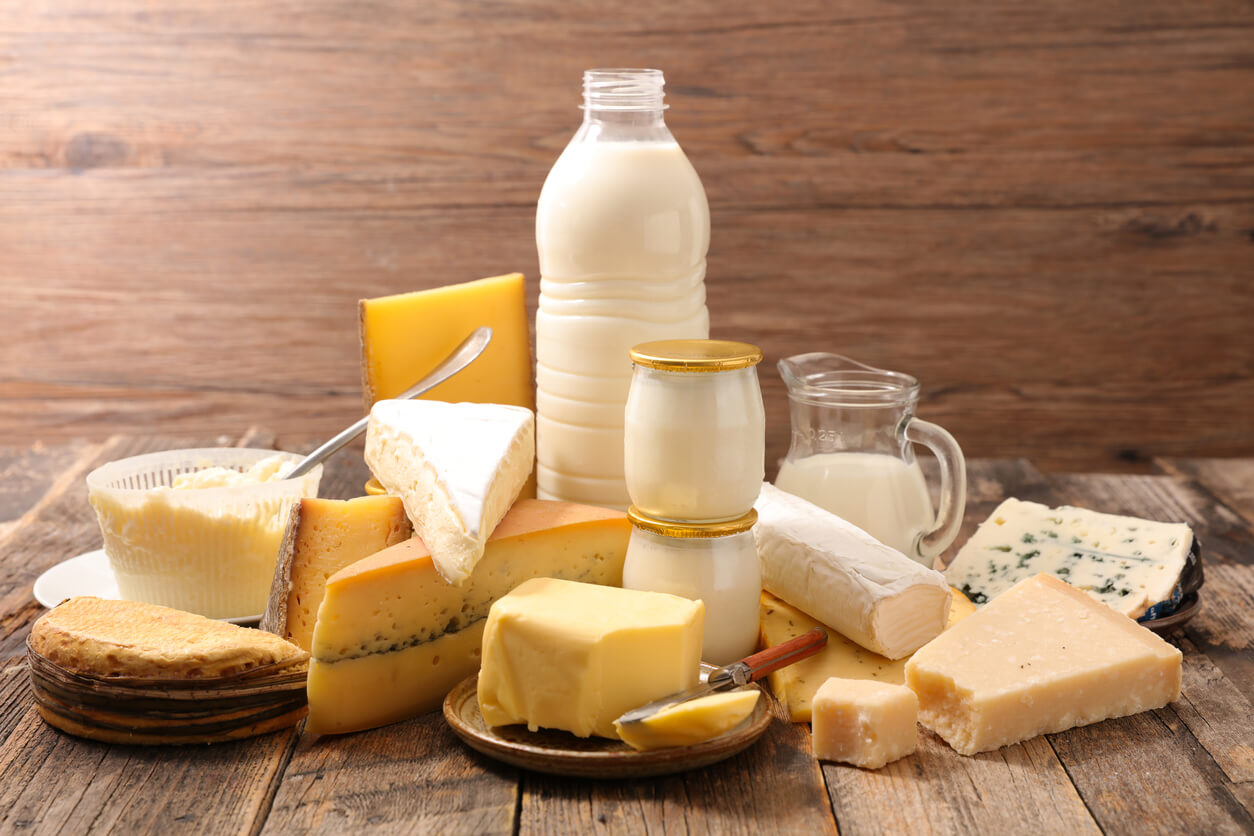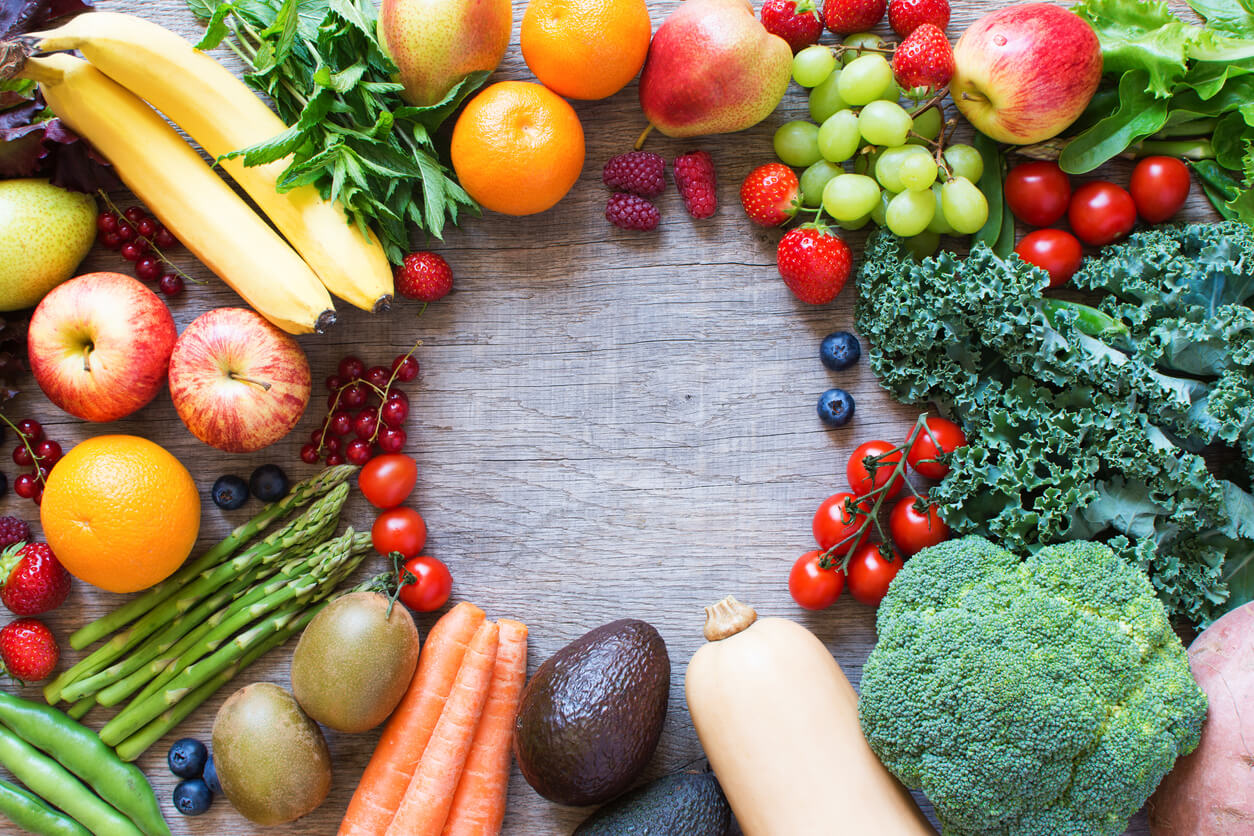4 Healthy Foods that Are Beneficial for Children's Teeth

Ensuring good oral hygiene is a key element in maintaining the health of the mouth and ensuring proper chewing. But this objective also depends on a sufficient intake of nutrients and other elements on a frequent basis. Therefore, it’s essential to know which are the healthy foods that are beneficial for children’s teeth.
Likewise, it’s important to highlight the importance of a balanced and varied diet in order to maintain a good state of health in the short and long term. Otherwise, there could be nutritional deficiencies that could have a negative impact on the developing organism of infants.
Having said all this, we’re going to tell you which foods shouldn’t be lacking in your children’s diet if you want them to maintain a healthy smile. Take note!
Foods that are beneficial for children’s teeth
As we’ve already mentioned, maintaining good habits favors oral and dental health, and among these, we can highlight the nutritional and hygienic ones. Brushing children’s teeth at least 2 or 3 times a day, with a proper technique, and using fluoride toothpaste prevent the formation of plaque and tartar. A diet that’s rich in essential nutrients and low in simple sugars is also considered a healthy habit.
Here, we’ll tell you what types of foods are especially beneficial for your child’s mouth.
1. Dairy

Milk, cheese, and yogurts are products that stand out for their calcium content. This mineral has been shown to be crucial for bone health, which includes teeth. Maintaining a sufficient intake of calcium reduces the incidence of reduced bone mineral density, which could predispose children the body to fractures over the years.
In addition to calcium, it’s important to ensure that vitamin D requirements are met. This element modulates the absorption and fixation of calcium in the bones. However, in most of the population, there’s a deficiency of this nutrient, so it may be necessary to include a supplement in the diet.
On the other hand, fermented dairy products are a source of probiotics, which are “good” bacteria that can colonize certain areas of the digestive tract and produce benefits for your health. According to a study published in the journal Oral Medicine, Oral Pathology and Oral Surgery, adequate consumption of probiotics could help prevent the development of problems such as tooth decay or periodontal disease.
2. Eggs
Eggs provide the highest quality protein, vitamin D, and calcium. All these elements will be determinants for growth and oral health.
Moreover, the myth that limited the consumption of these products on a weekly basis because of a possible cardiovascular risk has been debunked. Today, we know that this food should be present in the diet more frequently.
3. Celery and carrots
These products are crunchy in texture and also provide a lot of water and fiber. This helps to clean excess dental plaque and balance the sugar consumed in the diet. Also, chewing these foods produces a light massage on the child’s gums, which can stimulate local circulation and prevent inflammatory-type problems.
4. Green leafy vegetables
Most green leafy vegetables concentrate high doses of vitamin C, a key element in the maintenance of immune function or defenses. In addition, it’s a necessary nutrient for the formation of collagen, which is the most abundant protein in the supporting tissues of the human body.
Therefore, it’s essential to meet the daily requirements of vitamin C in order to prevent multiple diseases.

Include foods that are beneficial for children’s teeth in their diet
As you’ve seen, there are a number of foods that are very positive for children’s teeth. They can provide nutrients and probiotics that help maintain proper oral health and avoid complex problems that can jeopardize the digestive processes. In addition, we shouldn’t forget the need to implement adequate oral hygiene routines from the first stages of life.
Finally, we should mention the importance of attending biannual appointments with a pediatric dentist from the first year of life. These consultations are preventive and can offer timely treatment in the presence of early clinical signs. This way, you can learn how to take better care of your little ones’ mouths.
Ensuring good oral hygiene is a key element in maintaining the health of the mouth and ensuring proper chewing. But this objective also depends on a sufficient intake of nutrients and other elements on a frequent basis. Therefore, it’s essential to know which are the healthy foods that are beneficial for children’s teeth.
Likewise, it’s important to highlight the importance of a balanced and varied diet in order to maintain a good state of health in the short and long term. Otherwise, there could be nutritional deficiencies that could have a negative impact on the developing organism of infants.
Having said all this, we’re going to tell you which foods shouldn’t be lacking in your children’s diet if you want them to maintain a healthy smile. Take note!
Foods that are beneficial for children’s teeth
As we’ve already mentioned, maintaining good habits favors oral and dental health, and among these, we can highlight the nutritional and hygienic ones. Brushing children’s teeth at least 2 or 3 times a day, with a proper technique, and using fluoride toothpaste prevent the formation of plaque and tartar. A diet that’s rich in essential nutrients and low in simple sugars is also considered a healthy habit.
Here, we’ll tell you what types of foods are especially beneficial for your child’s mouth.
1. Dairy

Milk, cheese, and yogurts are products that stand out for their calcium content. This mineral has been shown to be crucial for bone health, which includes teeth. Maintaining a sufficient intake of calcium reduces the incidence of reduced bone mineral density, which could predispose children the body to fractures over the years.
In addition to calcium, it’s important to ensure that vitamin D requirements are met. This element modulates the absorption and fixation of calcium in the bones. However, in most of the population, there’s a deficiency of this nutrient, so it may be necessary to include a supplement in the diet.
On the other hand, fermented dairy products are a source of probiotics, which are “good” bacteria that can colonize certain areas of the digestive tract and produce benefits for your health. According to a study published in the journal Oral Medicine, Oral Pathology and Oral Surgery, adequate consumption of probiotics could help prevent the development of problems such as tooth decay or periodontal disease.
2. Eggs
Eggs provide the highest quality protein, vitamin D, and calcium. All these elements will be determinants for growth and oral health.
Moreover, the myth that limited the consumption of these products on a weekly basis because of a possible cardiovascular risk has been debunked. Today, we know that this food should be present in the diet more frequently.
3. Celery and carrots
These products are crunchy in texture and also provide a lot of water and fiber. This helps to clean excess dental plaque and balance the sugar consumed in the diet. Also, chewing these foods produces a light massage on the child’s gums, which can stimulate local circulation and prevent inflammatory-type problems.
4. Green leafy vegetables
Most green leafy vegetables concentrate high doses of vitamin C, a key element in the maintenance of immune function or defenses. In addition, it’s a necessary nutrient for the formation of collagen, which is the most abundant protein in the supporting tissues of the human body.
Therefore, it’s essential to meet the daily requirements of vitamin C in order to prevent multiple diseases.

Include foods that are beneficial for children’s teeth in their diet
As you’ve seen, there are a number of foods that are very positive for children’s teeth. They can provide nutrients and probiotics that help maintain proper oral health and avoid complex problems that can jeopardize the digestive processes. In addition, we shouldn’t forget the need to implement adequate oral hygiene routines from the first stages of life.
Finally, we should mention the importance of attending biannual appointments with a pediatric dentist from the first year of life. These consultations are preventive and can offer timely treatment in the presence of early clinical signs. This way, you can learn how to take better care of your little ones’ mouths.
All cited sources were thoroughly reviewed by our team to ensure their quality, reliability, currency, and validity. The bibliography of this article was considered reliable and of academic or scientific accuracy.
- Vannucci, L., Fossi, C., Quattrini, S., Guasti, L., Pampaloni, B., Gronchi, G., Giusti, F., Romagnoli, C., Cianferotti, L., Marcucci, G., & Brandi, M. L. (2018). Calcium Intake in Bone Health: A Focus on Calcium-Rich Mineral Waters. Nutrients, 10(12), 1930. https://doi.org/10.3390/nu10121930
- Seminario-Amez, M., López-López, J., Estrugo-Devesa, A., Ayuso-Montero, R., & Jané-Salas, E. (2017). Probiotics and oral health: A systematic review. Medicina oral, patologia oral y cirugia bucal, 22(3), e282–e288. https://doi.org/10.4317/medoral.21494
This text is provided for informational purposes only and does not replace consultation with a professional. If in doubt, consult your specialist.








